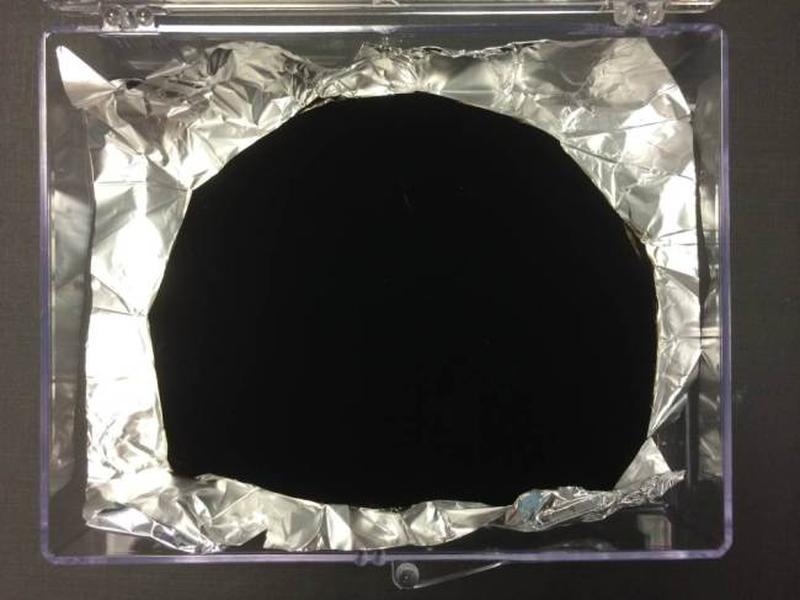Scientists create 'alien' material so dark you can't even see it


A free daily email with the biggest news stories of the day – and the best features from TheWeek.com
You are now subscribed
Your newsletter sign-up was successful
Surrey NanoSystems, a British company, has created a "strange, alien" material "so black that it absorbs all but 0.035 percent of visual light, setting a new world record," The Independent reports.
The material, named Vantablack, which is grown on sheets of aluminum foil and made with a coating of carbon nanotubes, is so dark that it's unrecognizable to the human eye. When the material covers the aluminum foil sheets, it's impossible to see the creases and wrinkles underneath it. Vantablack was described in the Optics Express journal and will be shown at the Farnborough International Airshow this week.
"Many people think black is the absence of light. I totally disagree with that. Unless you are looking at a black hole, nobody has actually seen something which has no light," Stephen Westland, professor of color science and technology at Leeds University, told The Independent. "These new materials, they are pretty much as black as we can get, almost as close to a black hole as we could imagine."
The Week
Escape your echo chamber. Get the facts behind the news, plus analysis from multiple perspectives.

Sign up for The Week's Free Newsletters
From our morning news briefing to a weekly Good News Newsletter, get the best of The Week delivered directly to your inbox.
From our morning news briefing to a weekly Good News Newsletter, get the best of The Week delivered directly to your inbox.
According to The Independent, Vantablack will make astronomical cameras, telescopes, and infrared scanning systems "function more effectively." In more practical uses, Vantablack is used in conjunction with calibrating cameras to photograph "the oldest objects in the universe," which requires a background that's as black as possible. The material also has military uses that Surrey NanoSystems can't discuss. Mysterious!
Unfortunately, the cost of Vantablack is also something Surrey NanoSystems can't — or won't — reveal, so don't get too excited about a Vantablack dress anytime soon.
"You would lose all features of the dress," Ben Jensen, Surrey NanoSystems' chief technical officer, told The Independent. "It would just be something black passing through."
A free daily email with the biggest news stories of the day – and the best features from TheWeek.com
Meghan DeMaria is a staff writer at TheWeek.com. She has previously worked for USA Today and Marie Claire.
-
 The Gallivant: style and charm steps from Camber Sands
The Gallivant: style and charm steps from Camber SandsThe Week Recommends Nestled behind the dunes, this luxury hotel is a great place to hunker down and get cosy
-
 The President’s Cake: ‘sweet tragedy’ about a little girl on a baking mission in Iraq
The President’s Cake: ‘sweet tragedy’ about a little girl on a baking mission in IraqThe Week Recommends Charming debut from Hasan Hadi is filled with ‘vivid characters’
-
 Kia EV4: a ‘terrifically comfy’ electric car
Kia EV4: a ‘terrifically comfy’ electric carThe Week Recommends The family-friendly vehicle has ‘plush seats’ and generous space
-
 Blue Origin launches Mars probes in NASA debut
Blue Origin launches Mars probes in NASA debutSpeed Read The New Glenn rocket is carrying small twin spacecraft toward Mars as part of NASA’s Escapade mission
-
 Dinosaurs were thriving before asteroid, study finds
Dinosaurs were thriving before asteroid, study findsSpeed Read The dinosaurs would not have gone extinct if not for the asteroid
-
 SpaceX breaks Starship losing streak in 10th test
SpaceX breaks Starship losing streak in 10th testspeed read The Starship rocket's test flight was largely successful, deploying eight dummy satellites during its hour in space
-
 Rabbits with 'horns' sighted across Colorado
Rabbits with 'horns' sighted across Coloradospeed read These creatures are infected with the 'mostly harmless' Shope papilloma virus
-
 Lithium shows promise in Alzheimer's study
Lithium shows promise in Alzheimer's studySpeed Read Potential new treatments could use small amounts of the common metal
-
 Scientists discover cause of massive sea star die-off
Scientists discover cause of massive sea star die-offSpeed Read A bacteria related to cholera has been found responsible for the deaths of more than 5 billion sea stars
-
 'Thriving' ecosystem found 30,000 feet undersea
'Thriving' ecosystem found 30,000 feet underseaSpeed Read Researchers discovered communities of creatures living in frigid, pitch-black waters under high pressure
-
 New York plans first nuclear plant in 36 years
New York plans first nuclear plant in 36 yearsSpeed Read The plant, to be constructed somewhere in upstate New York, will produce enough energy to power a million homes
